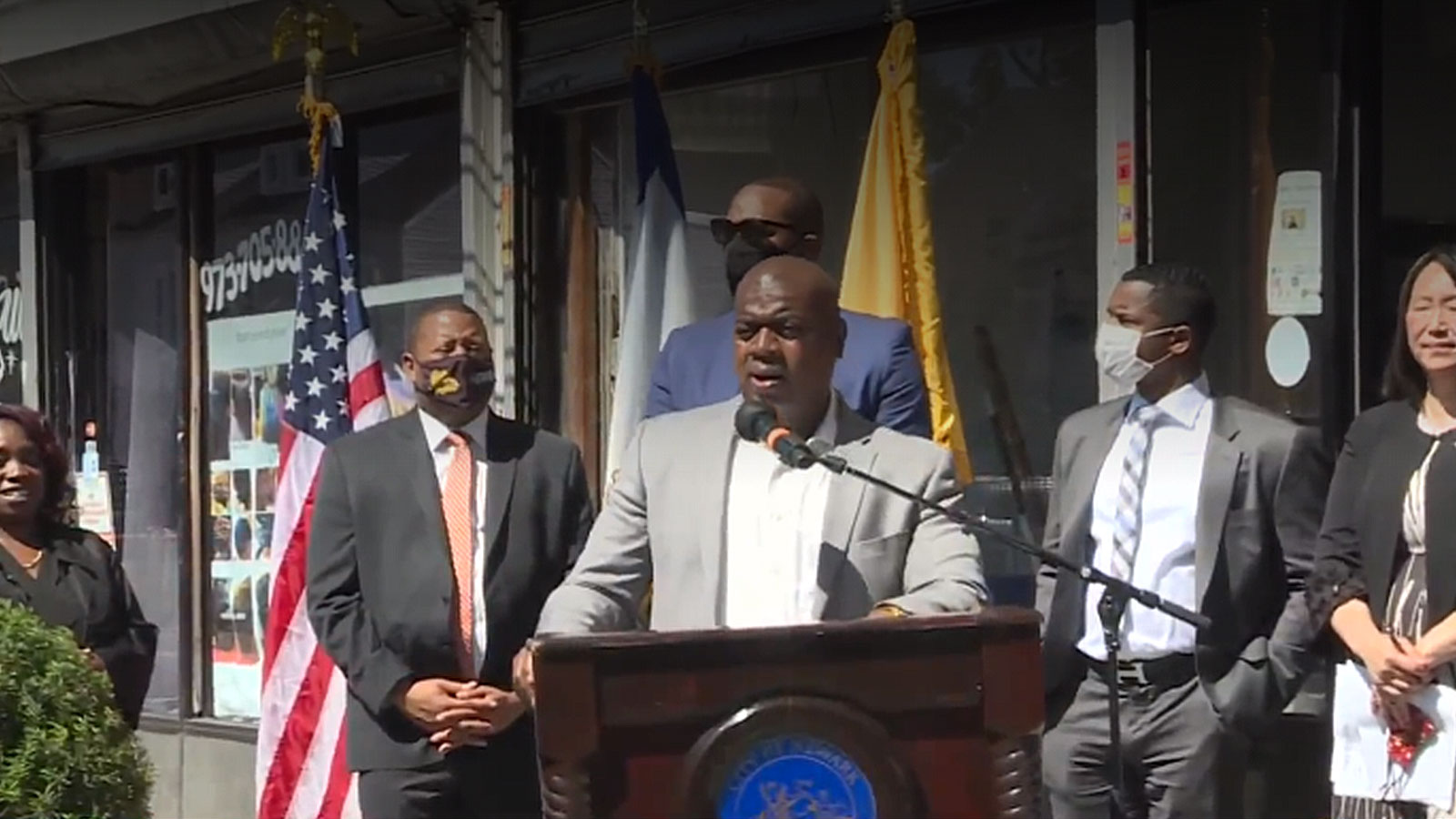Investment will focus on small businesses, equitable development, and neighborhoods; Funding comes from 2021 American Rescue Plan legislation to create affordable commercial space.
Mayor Ras J. Baraka announced last week that Newark is launching an ambitious two-year economic recovery program at a press conference at Kleen Kutz Unisex Beauty Salon at 1011 Bergen Street. The program will help small businesses like Kleen Kutz connect to grants, technical assistance and other wraparound services to support business recovery. The plan’s investments in neighborhood revitalization programs will help create thriving commercial corridors and bring customers back. In its first year, the program will have an $8.8 million budget. Kleen Kutz is an example of a small business that has already benefited from prior grants.
“This plan is a map for a stronger, fairer, and more prosperous Newark,” said Mayor Baraka. “After this incredibly challenging year of mourning, loss, and economic uncertainty, we have turned the corner. We are fortunate to have a historic level of investment from the federal government that provides the kind of support our small businesses and residents need. Before the pandemic, Newark was experiencing a period of rapid investment and economic expansion guided by our principles of equitable growth. This plan resumes that progress. It will bring customers back, build on Newark’s growing reputation as an exciting place to invest, and grow good jobs with economic mobility for Newarkers.”
The two-year recovery plan puts good jobs, equitable development, the growth of small businesses, and investment in Newark’s neighborhoods at the center. It sets out bold initiatives, which will address the economic stress experienced by many households as a result of the pandemic and Newark’s racial wealth gap, so that the city will be a place where all residents can thrive.
The plan will use federal funding from the 2021 American Rescue Plan legislation to build a tech cluster, create permanently affordable commercial space, offer free or low-cost broadband access to small business through Newark Fiber, and expedite development approvals. It aligns with the City’s workforce system to ensure that Newarkers — particularly unemployed, underemployed, and residents with barriers to employment — are connected to good job opportunities.
The Economic Recovery Plan is the first of a package of recovery initiatives that Mayor Baraka will be launching over the next eight weeks, including:
- Expanded emergency rental assistance
- Expanded small business emergency assistance
- Five-year affordable housing goals
- A portal of available affordable housing
- “Back Together Again,” a series of community solidarity events
- Additional neighborhood redevelopment designations
- NewarkGo, a low cost transportation pilot using dockless bikes and e-scooters
The plan was developed in collaboration with Bloomberg Associates, a pro-bono philanthropic consultancy that works with cities and mayors around the world. It builds on ideas from the Newark Equitable Growth Commission, the Newark Forward recommendations, national best practices and the work done through the Reopening and Recovery Strikeforce and other economic development strategies. In addition, the City’s Department of Economic and Housing Development met with local stakeholders and conducted extensive outreach over a period of four months to better understand what Newark needs to support a lasting, equitable recovery.
Background
The pandemic has had a devastating impact on Newark’s hardworking residents and small business owners. Businesses that are minority owned, immigrant-owned, locally owned, and women-owned have been particularly hard hit. Between February and May 2020, 16,000 residents lost jobs, bringing Newark’s unemployment to 19 percent. As of May 2021, Newark’s unemployment still remains almost double than the national average at 10.7 percent.
Job losses in Newark have been concentrated in four sectors: hospitality, healthcare/social services, retail, and “other services,” which represent 60 percent of all jobs lost. These job losses have resulted in $60-$100 million of lost consumer spending that would otherwise have gone to Newark businesses, even after factoring in government benefits. Sectors with high concentrations of small businesses will take the longest to recover.
“Over the past several months, I’ve heard from small business owners, our strong network of Business Improvement Districts and Special Improvement Districts, and numerous other partners about their vision for an equitable economic recovery. This plan closely reflects those conversations. I look forward to delivering the bright future that this plan promises for a more vibrant, prosperous Newark,” said Deputy Mayor of Economic and Housing Development Allison Ladd.
“These economic recovery initiatives will address the current needs of Newark’s business and development community through a grassroots approach that fosters inclusivity and local innovation,” said Invest Newark President & CEO Bernel Hall.
“This recovery plan will shorten the period Newark will take to get back on its feet. It’s both ambitious and feasible. We commend Mayor Baraka on his leadership, collaborative approach, and bold vision. This plan is a model for cities large and small across the country, and we look forward to continuing to support the City of Newark by bringing this plan to action,” said Gordon Innes of Bloomberg Associates.















